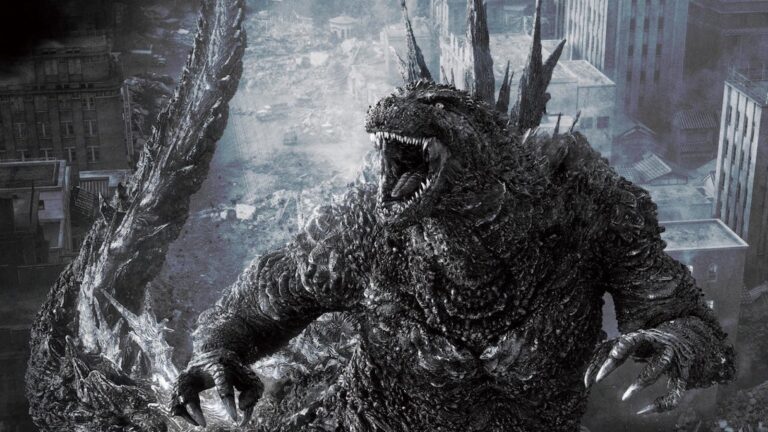I know I’m late to the party. Godzilla Minus One (hereafter just referred to as Godzilla for simplicity’s sake) is currently in theaters in black and white, so it’s aptly titled Godzilla Minus One Minus Color, which is just silly. However, I’m glad that I missed out on its color run in theaters and instead caught this version. I think it emphasizes the setting, atmosphere, and emotion behind the film. Godzilla manages to do something the big budget spectacle films coming out of “the West” have failed to do in years—it actually made me feel for the human drama at the core of the story. The film had something true and valuable to say.
Godzilla follows in the footsteps of the original film in that it brings the monster back to his origins as a primal force of nature—a thing to be feared, not a semi-heroic protector fighting other monsters. This Godzilla should not be sold as a plushie. Instead, his first appearance is played more similarly to a horror film—a scene that is frighteningly effective in the stark black and white.
Like the original, the new movie is set in post-war Japan. Unlike the original, where Godzilla is used primarily as a reflection on the horrors of the nuclear bomb, this one is a direct critique of the Japanese government and their total disregard for the lives of their citizens. The anti-war, anti-government message is particularly salient now (and I suppose it’s eternally relevant, unfortunately). The critique is baked into the situations the characters find themselves in.
Shikishima (the main protagonist) is a “failed” kamikaze pilot. After surviving Godzilla’s initial attack and facing survivor’s guilt, Shikishima returns to a bombed out Tokyo to find that his parents died and his neighbor lost her children. It’s a gut-wrenching portrayal of the ravages of war and the resiliency of the survivors. Shikishima has a chance encounter with Noriko and the orphan baby Akiko who she is caring for, and the three form a family. These relationships and the friendships Shikishima finds with his fellow minesweepers form the backbone of the movie.
Following these characters through Japan’s rebuilding, all while Shikishima continues to wrestle with his guilt and terror over his encounter with Godzilla, lends this movie an emotional heft that is by and large missing from “spectacle filmmaking.” Unlike the legendary Godzilla movies where you are bored to tears waiting between monster appearances, the characters in this movie are so well-played and treated that you actually care about their lives and their fates. It’s a breath of fresh air in the current blockbuster movie landscape where films tend to be utterly devoid of humanity.
The other big comparison point with Godzilla Minus One and its legendary counterparts is that the characters who are left to fight off Godzilla are, in their words, private citizens. Compared to the American films where everyone must be special forces or in some kind of shadowy government or extra-government branch, Godzilla Minus One dispels the notion that the government will save the people. Instead the people of Tokyo band together and use their resources and know-how to fight the monster.
It’s a wonderfully made film that everyone should go see. To me, this level of emotional quality and meaning is what we should be demanding in our cinema, instead of the soulless dreck that passes for wide-appeal entertainment. I never would have thought that a Godzilla movie would be this good, but I’m happy to have been proven wrong.














Add comment